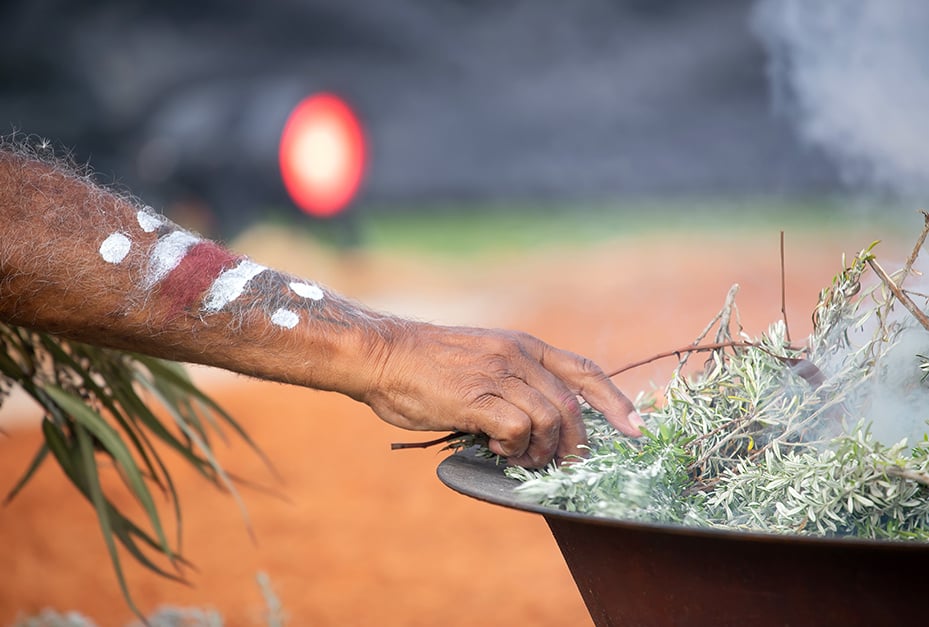To celebrate, honour and preserve their cultural heritage, Indigenous peoples perform cultural ceremonies, involving traditional practices and rituals.
These ceremonies vary widely among different Indigenous communities but generally serve to connect participants with their history, land, ancestors and spiritual beliefs. Some common types of Indigenous cultural ceremonies include Welcome to Country, Initiation ceremonies, Dreamtime stories and Corroboree.
As an Indigenous-owned construction business, BY Group highly values Indigenous cultural ceremonies. Read on to learn the importance and benefits of doing so, and how organisations can incorporate these ceremonies throughout the construction process.
The historical importance of cultural ceremonies for Indigenous Australians
Content Warning: This section discusses Indigenous Australian history which some readers may find sensitive or distressing.
The historical context of Indigenous cultural ceremonies is deeply rooted in the traditions and lifestyles of Indigenous peoples, dating back thousands of years, evolving with the communities that practise them. They are based on an intricate understanding of the land, seasons and natural cycles, and are integral to the social, spiritual and cultural fabric of Indigenous communities.
During the colonial era, cultural suppression meant that such cultural ceremonies were banned or discouraged. Traditional resources were restricted and sacred sites were desecrated, further impacting the ability of Indigenous communities to conduct traditional ceremonies. This is why its importance in contemporary society cannot be overstated.
How Indigenous cultural ceremonies are incorporated in construction
Before construction, it is recommended to conduct Welcome to Country ceremonies and Smoking Ceremonies to cleanse the site and seek permission from Traditional Custodians, as well as engage Elders and community leaders in planning.
During construction, maintaining ongoing cultural practices and engagement is recommended. This could involve holding periodic ceremonies to mark significant milestones or address specific concerns.
After construction, closing ceremonies may be performed to signify the completion of the project and give thanks. This demonstrates ongoing respect and acknowledges the contributions and presence of Indigenous communities.
A key consideration throughout should be the importance of cultural sensitivity and ensuring that all ceremonies are conducted respectfully and appropriately.
Why incorporating Indigenous cultural ceremonies is important to construction
Carrying out Indigenous cultural ceremonies before, during and after construction projects in Australia is crucial for several reasons. These include:
-
Environmental Stewardship:
Indigenous ceremonies often highlight a deep spiritual and ecological connection to the land. As any construction work carried out takes place on Indigenous-owned land, this perspective can inform more environmentally sustainable construction practices. These ceremonies can also raise awareness among project teams about the importance of protecting and respecting natural landscapes and ecosystems, fostering a deeper respect for the land and environment among all stakeholders. -
Acknowledgement of Traditional Custodians:
Cultural ceremonies such as Welcome to Country and Smoking Ceremonies formally acknowledge the Traditional Custodians of the land, and provide an opportunity to actively engage with Indigenous Elders and communities at the beginning of a project. This is a mark of respect for their enduring connection to the land and its significance. -
Community Trust:
Conducting cultural ceremonies demonstrates a genuine commitment to respecting and valuing Indigenous cultures. This helps build trust and therefore respectful and positive relationships with local Indigenous communities, contributing to the success of projects and community satisfaction. -
Legal and Ethical Compliance:
In many cases, there are legal obligations to consult with Indigenous communities and respect cultural heritage, such as Indigenous Land Use Agreements (ILUAs) or the Aboriginal Heritage Act 2006 in the state of Victoria. Conducting ceremonies helps fulfil these regulatory requirements by playing a part in the process of negotiating and formalising such laws and agreements. Moreover, respecting the rights and traditions of Indigenous peoples means adhering to ethical business standards and therefore aligning with broader Corporate Social Responsibility (CSR) goals. -
Cultural Awareness and Inclusivity:
Involving construction teams in these ceremonies provides valuable learning experiences about Indigenous cultures and histories, promoting greater cultural awareness and sensitivity. Emphasising the importance of cultural practices also creates a more inclusive and respectful workplace environment for everyone, but especially for Indigenous employees. This has a positive impact on workers’ morale, pride and sense of belonging. These ceremonies also provide an opportunity to educate non-Indigenous employees about Indigenous culture and history. -
Economic Opportunities:
The genuine respect shown through conducting cultural ceremonies can lead to more open and cooperative relationships, where communities are more willing to engage and collaborate. These engagements with Indigenous communities can then lead to economic benefits, such as employment, training opportunities and business partnerships for Indigenous peoples, further driving reconciliation.
The key takeaway:
Integrating Indigenous cultural ceremonies in construction projects is not only about respecting and honouring Indigenous cultures but also about fostering better relationships, ensuring ethical practices, and contributing to the broader goals of reconciliation and social cohesion in Australia.
For construction companies, this approach leads to more sustainable, respectful, and successful project outcomes.
Connect with BY Group on LinkedIn!
If you’d like to learn more about BY Group, and our construction experience, capability, and approach, please get in touch to discuss your next project and how we can help.

